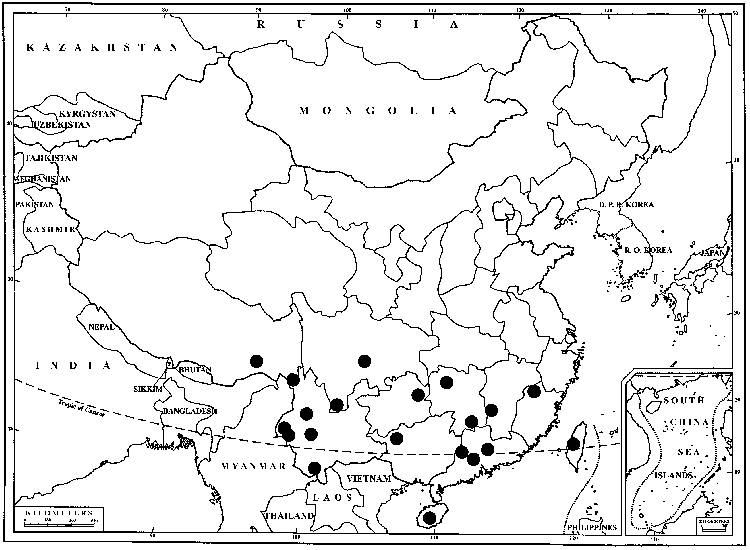Fissidens polypodioides
Sp. Musc. Frond., 154. 1801,.
Plants to 50 × 6.5 mm. Stem unbranched and sparingly branched; axillary hyaline nodules absent; central strand present. Leaves as many as 80 pairs, somewhat undulate, oblong, obtuse to broadly acute, usually bluntly mucronate, to 4 × 1 mm; dorsal lamina rounded proximally, ending at insertion; vaginant laminae 1/2 the leaf length, acute, ± equal, minor lamina ending on or near margin; margin entire but denticulate distally, elimbate; costa percurrent to ending 2–4 cells before apex, taxifolius-type; laminal cells 1-stratose, distinct, smooth, slightly bulging, firm-walled, irregularly hexagonal, 10–20 µm, larger juxtacostally, smaller at margin. Sexual condition dioicous; perigonia and perichaetia on short axillary branches and main-stems. Sporophytes 1–2 per perichaetium. Seta to 15 mm. Capsule theca slightly inclined, radially symmetric or slightly arcuate, bilaterally symmetric, to 2.5 mm; operculum about as long as theca. Calyptra cucullate, smooth, 1.5–1.55 mm. Spores 9–11 µm.
Habitat: Calcareous soil, and limestone rocks and boulders along streams and in ravines
Distribution

Ala., Fla., Ga., Ind., La., Miss., N.C., S.C., Tex., Mexico, West Indies, Central America, South America, Asia
Discussion
Fissidens polypodioides is a robust species and has its greatest distribution in the neotropics and Asia. It is perhaps the handsomest species of the genus in the flora area. However, it might be confused with F. asplenioides, from which it is distinguished by taxifolius-type costa, leaves crisped but not curled tightly inward when dry, entire leaf margin, acute and more or less equal vaginant laminae, larger laminal cells that are not lenticularly thickened, and absent differentiated medial marginal cells in the vaginant laminae. The central strand is especially well developed. H. A. Crum and L. E. Anderson (1965, 1981) published illustrations of F. polypodioides and F. asplenioides that aid greatly in distinguishing the two.
Selected References
None.
Lower Taxa
No values specified."/2" is not declared as a valid unit of measurement for this property.